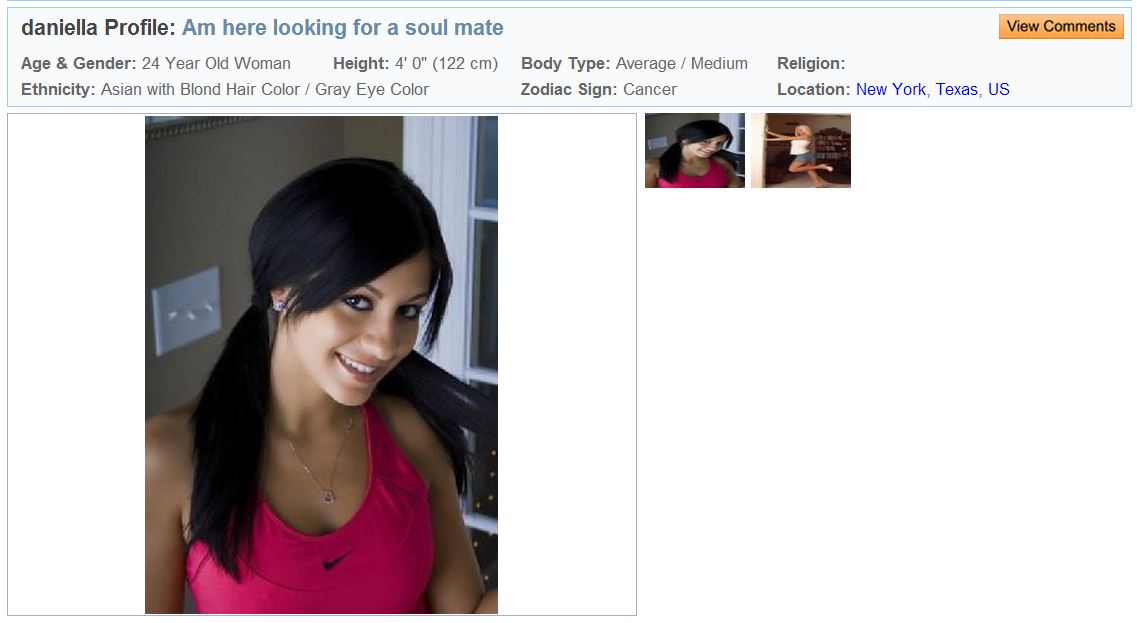Spotting romance scammers.
To navigate, use the arrow keys on the bottom right hand side of the screen.
(c) ScamSurvivors 2014-2023
In this demonstration we will show some of the ways we spot romance scammers. We will explain such things as the photos used, the phrases to look out for, etc. We'll also show you some of the tricks used and lies told in order to steal YOUR hard earned money.
The information found here can be copied and shared elsewhere, provided proper credit is given to ScamSurvivors.com
Firstly, no single sign should be treated as 100% proof the person is a scammer. Each one found is a piece of the jigsaw that shows their true intention. There's a lot of information to take in, so take your time and work through it at your own pace.
Often, with enough practice you'll be able to not only spot a scam, but be able to tell where the scammer is located with nothing more than a quick glance at their profile.
Let's start with the images used. Most are stolen from social networking or modelling sites. There are several image search sites online that you can use to try and identify who the person in the photos really is such as Google image search, Yandex or Tineye.
There's even an extension you can add to your browser that'll allow you to search several image search engines at once with a right click of the mouse. Simply search for a search by image extension and install the one that matches your browser. It has a number of search engines listed, and you can choose which ones to use as not all search engines are created equally.
Quite often you'll see images of the same person used on multiple profiles, as shown in the next few slides. The following profiles all use photos of the same model. Every profile you will see throughout this presentation were found on the same dating site.





Sometimes the stolen images are of someone so famous there's no need to do a search for their identity.

Another thing to look for is a profile using pictures of two or more different people. See how in the next two slides the scammer uses images of a brunette and a blonde in the same profile.

Russian and Ukrainian scammers can be differentiated by the type of images they use. Generally, Russians use more "girl next door" shots and may even pay local females to pose, while Ukrainians use stolen model images. The next image was sent by a Russian scammer, the one after that by a Ukrainian.


The difference is plain to see once you know what to look for. Here are two more examples. At this point there shouldn't be any need to say which is which.


Now it's time to move on to the profile text to find anything that doesn't match the image.
The next profile looks normal until you check out their description. The profile page is on the next page, the description on the one after. The image on the next page and the "about me" on the one after are VERY different.


That description was likely stolen from a different profile and used without the scammer even bothering to proof read it. Always do a search on the text they use to see where else it appears.
You may not have noticed it the first time, but the very first image you saw claimed to be African American with black hair. Click to see it again.

It's obvious when you know what you're looking for, or if you take more than just a passing glance at the profile sometimes. Don't let the images distract you. Take the time to actually read the profile.
Let's take a second look at another earlier profile and check out the description. Can you find the errors?

Did you spot them? New York is not in Texas, she's not Asian, she doesn't have gray eyes and she's definitely not four foot tall. We're not finished there though. There's still even more to see.
A profile's text can not only identify it as a scam, but also give a good indication as to which kind of scam it's likely to be and even where in the world the scammer is based. Let's take one more look, but this time pay close attention to the very top line.

"AM here looking for a soul mate". Typically, using "am" instead of "I am" is a sign the scammer is in West Africa.
Other phrases we'd look for are "by name", "by profession", "the only child of my parents" instead of "an only child", "never married with no kid", "God fearing" and "I will like" instead of "I would like".
Also keep a look out for names like "XXXX4real" or "XXXX4luv" as well as misspelled names.
Here's another example of "AM", plus another typical scammer mistake. Many misunderstand the meaning of "Native American" and assume it means American.

Scammers love to spin sob stories about a dead partner (typically a car crash or cancer). They're left looking after the child, or "kid" as they refer to them. Don't be fooled, as neither exist. They even write to you pretending to be the child and calling you "mummy" or "daddy".
Other things to look out for are the name being the wrong way around (lastname, firstname), the gender or age in their text not matching the profile image, claiming to be "but currently in XXXXXX" (usually somewhere in Africa) and the default options being chosen.
Scammers will pretend to be in the military. The next two slides show one such profile, plus the image search result showing the real identity of the person in the image.


Scammers try to get people off the site and into private conversations quickly. Look out for ones with their email address in the profile or first message to you, as this next slide demonstrates.

Some will break up the email to try and disguise it.

We always check the email address to see if it's listed on any other antiscam or dating/social networking sites. Sometimes this can lead to other profiles owned by the scammer.
Never search purely by the name used, as that can lead to genuine profiles that have nothing to do with scams. Multiple people can share the same name, but only one person can own an email address.
Before we move on to the tactics used by scammers if they're already talking to someone, it's worth pointing out another form of scam where the scammer actually meets the person. The scam in this case is that they expect or even demand the person buy them expensive items and take them to the most expensive places to eat and drink.
Hotels, taxi fares, meals/drinks etc. will be inflated in price, with the female splitting the difference with her accomplices at a later date. Gifts may be taken back to the store and returned for cash. It's a "production line" scam, designed purely to string the victims along and make money. This type of scam is much rarer, but still worth mentioning here.
Back to the tactics used by online scammers. Their words and actions can often give them away, even at this point. Often it can even allow you to tell where the scammer is based, as certain parts of the world tend to have variations of the same scam.
Scammers use stolen photos, so will come up with excuses why they can't appear on webcam with you. If they talk to you on the phone, their accent may not match the nationality they claim to be. Scammers may try to handwave this away by claiming to be of mixed race.
As well as in their profiles, scammers can use stolen text in their replies and emails to you. Do a search of some of the sentences from them to see if anything shows up. With Russian/Ukrainian scammers, the length of the emails suddenly dropping drastically is an indicator they're having to manually write them as they've come to the end of the pre-scripted ones they were using to that point.
How quickly did they profess their love for you? After two emails? Three? A week? Did they start referring to you as their wife/husband and to their child (if they claim to have one) as "our" daughter/son? This is to increase the "bond" you have with them and make you more willing to send them money when the "emergency" arises. The "son/daughter" may even add you too and start referring to you as mom or dad.
Scammers pretending to be soldiers often spin the same tales about having treasures/gold/money they found that they want you to help bring into the country, how they need a "special" phone to talk to you, or how they need to pay to be able to take leave and come visit you.
Are they telling you to keep your love a secret for now? They do that because if you talk to someone else, they may see it with a fresh pair of eyes as a scam and warn you. It's the same reason they may call/text/IM you at all hours of the day and night - to keep you tired, isolated and not thinking straight.
Do they ask you a lot of questions about yourself without ever really giving that much back? Scammers profile their victims, even going as far as sending them a list of questions to answer. This helps them work out what angle to approach you from. If you're a hopeless romantic, they'll use that, but if you talk about wanting children, that's the crack in your armour they'll attack.
Do the emails include your name too many times to feel natural? Some Russian and Ukrainian scammers use email programs that can send out replies automatically, without the need for them to be read first. These have an option to place the person's name in the email at certain points. They tend to overdo it though, making it easy to spot.
Another sign is that the email rambles on without ever answering any questions you asked in the previous email, or only briefly answering them in a way that makes the answer feel tacked on and out of character with the rest of the text.
Russian scammers tend to differ from Ukrainians in their methods, as the Russians will ask for money for a visa/plane ticket etc. to visit you, whereas a Ukrainian scammer is more likely to ask for money to continue paying for a "translation agency" to allow you both to continue communicating.
If they sent you any form of ID or document, take a good, close look to see if it's been altered in any way. Does the photo look like it's been pasted on using software? Are there discrepancies in the patterns in the watermark? Does any of the text look like it's been changed, or parts look like they've been cut out or copied over?
These next two slides show fake passports that have been used by scammers in the past. See if you can spot the warning signs. In the first one, all you need do is look at the photo. For the second one, check out the photo, the differences in the text and the parts that have been copied over or pasted in.


Did they ask you to undress on webcam or send some "saucy" images to them, especially if they claimed to be unable to do the same back? Some scammers will keep the images or capture the webcam footage using screen grabbing software, and use it for extortion at a later date if their victim refuses to send any more money or threatens them with law enforcement. This is different to sextortion/webcam blackmail, which is covered elsewhere on the site.
If they claimed to be on their way to meet you, did they then not turn up, claiming some incident stopped them? Typical scammer excuses are being robbed on the way, suffering an injury or even being arrested for carrying too much money/their gift to you on the plane. This can result in even more money requests.
One fairly new tactic is for the scammer to claim they've sent a gift, and give a link to a fake courier company website they've created as "proof". It will appear as if the gift is on its way, but the fake company will then request fees to complete the delivery. This bypasses the warnings given of never sending money to people online, as it appears the money is going to a company rather than an individual.
Another is for the scammer to create a fake cryprocurrency site and persuade the person to invest with them. Should the person request their money back, the fake site will either continue to make the person jump through hoops, or simply close.
Similarly, they may use a fake/cloned bank website to make it appear as if they have enough funds in an account to pay back any "loans" they ask for, or a fake company website with their fake character's details on it as a CEO. These are all designed to create a false air of legitimacy around the scammer.
Some scammers do send gifts as a "convincer", and to make the person feel indebted to them when they ask for a "favor" later on. These are different to the fake ones discussed earlier, as these will be of much less value and usually paid for using stolen details or by tricking another person into sending them.
Some scammers ask their victims to accept money into their bank account and then forward it on to them via money transfer service. The money being sent will be from another victim, and when they realise they've been scammed, the only details they have are those of the bank account owner. The person whose account is used is referred to as a mule, and will be held liable for the money, sometimes resulting in a jail sentence.
Simply put, did they ask for money for any reason? The end goal of the scam is to separate you from your money. If they can come up with a reason to ask for money and think they can get away with it, they will. They also don't care if it leaves the person homeless or penniless, so long as they get what they want.
Remember the #1 rule - NEVER send money to anyone you haven't met in person or anyone they introduce you to, no matter what reason they give or emergency they claim is happening.
Even if you did meet them, be wary. Some scams involve meeting the person, even going as far as to marry them. These are known as "green card" scams, and the purpose of these are to - as the name suggests - obtain a green card to allow them and their family into the country.
We have heard reports from green card scam victims where, once the scammer could legally stay in the country, they claimed the victim was violent to them in order to not only divorce them but get half their money in the settlement.
If you find you're dealing with a scammer, don't feel alone or that you did anything wrong. The scammer is the person to blame, not you. Scammers lie. They're very good at lying. They can offer you the Sun, stars and Moon, knowing they'll never have to deliver on their promises. Talk to people about it. Tell your friends and family. They'll understand and be there for you. Warn others so they don't fall for the same scam.
Drop all contact with them immediately. Telling them you know it's a scam lets them know they made a mistake somewhere and allows them to learn from that mistake, meaning the others they're scamming won't be so lucky. Trying to "out" them can result in them spinning another tale about how they were trying to scam you, but fell in love with you while doing so. This can take the scam in a new direction with them admitting their real identity and continuing to scam you using that.
It can also lead to a "recovery scam" where they write to you again, claiming to be law enforcement or a government agency that can retrieve the money you sent, but for a fee to cover the costs involved. Many fall for this scam and end up losing even more money in the hopes they can get back what they've already lost.
You can post their details anonymously by clicking THIS LINK and joining our forum. The details you share today may save someone else tomorrow.
If this helped you, please consider donating to help cover our running costs. We are completely self sufficient, and receive no external grants. Help us to help others.

This is the end of the presentation. Click HERE to go to our main page, or HERE to return to the start.